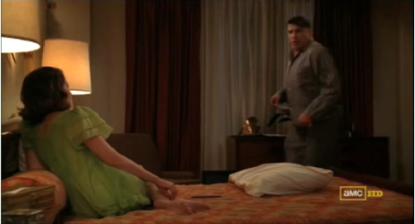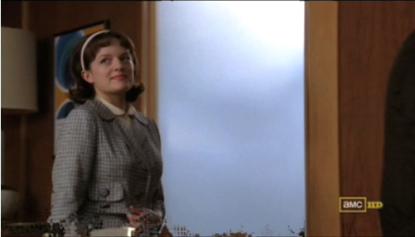In this week’s episode, we saw a few storylines the writers left open come to some sort of fruition: Sal’s latent homosexuality, Sally’s relationship with her grandfather, and the Patio ad campaign. Parent-Child relationships were examined, as were the evolving business ethics of the time. But, of course, the character I was most interested in was Peggy and her bull-headed, practical self-discovery.
While working on the Patio commercial as director, we are given a rare glimpse of Sal at home with his wife. She comes into the bedroom wearing a poofy avocado green teddy that I guess was supposed to be sexy. Sal made an appropriately manly joke about the article of clothing, which his wife Kitty had bought on sale, being more than “twenty percent off.” When they start making out, Sal puts a stop to it. “I’m working,” he explains. But Kitty is forlorn. It’s clear the two haven’t been intimate for a significant amount of time. He makes an excuse that isn’t exactly false. “For months I’ve been watching my job disappear,” he says as he explains the opportunity he’s been given. “I don’t want to fail.” He then proceeds to demonstrate the gist of the commercial, prancing and mincing and miming for Kitty. We know he does it too well.

Kitty sees this too. She has a look of sudden understanding, distressed and sad. She might not have put it into a conscious thought, but Kitty knows: Sal is gay.
Imagine. Learning that your spouse’s sexuality is not compatible with yours. It’s a devastating realization, I’m sure. How Kitty will handle this will be interesting to see. Unless she pulls a Betty and pretends nothing’s wrong.
The episode opens with Gene teaching Sally, who is about seven or eight years old, how to drive. It was pretty awesome.

Gene’s taken with Sally, and has approached their relationship with humor and sarcasm. He seems to feel a responsibility to mentor Sally, and it seems to have something to do with how he treated Betty as a child. “You’ve always been sensitive. That’s my fault for shielding you from all the dangers out there,” he says to Betty as they discuss his will. “I’m your little girl,” Betty responds, incapable of dealing with any semblance of an adult relationship with her father. His correspondence with Sally is more mature. The two have an understanding. “You can really do something,” Gene tells Sally over sneaked ice cream, “Don’t let your mother tell you otherwise.”
Gene fills a role that Betty doesn’t provide Sally. It’s almost as if he sees this time with Sally to do it all over again, rewrite the mistakes he made as a parent. He wants more for Sally than a domestic life, one where she fills the role of wife and mother—Betty’s execution of both of those roles is superficial.
We saw this theme carried out with a new client of Sterling Cooper. A young, cocky, and limitlessly wealthy young man named Ho Ho presents a proposal to the firm. Make Jai Alai the next baseball. Replete with grand expectations about television shows and feature films, Ho Ho is convinced Jai Alai will be, with the right marketing, the next American pastime. The guys at Sterling Cooper see money signs; Ho Ho is willing to pay, so they’re willing to try and give him what he wants—for a million dollars. Don is concerned. Ho Ho’s father is “connected to Burt Cooper in a thousand different ways,” explains Don.
So they bring in Ho Ho’s father, Horace Cook Sr. Horace acknowledges the hairbraindedness of Ho Ho’s scheme, but wants the firm to take his money and move forward. “should you be lucky enough to strike gold,” he says, “remember that your children weren’t there to see you swinging the pick… My son lives in a cloud of success, but it’s my success. Perhaps when that evaporates and his face is presses against the reality of the sidewalk he’ll be of value to someone.” It’s heartbreaking to watch. This father wants his son to fail, to have the carpet ripped from under his feet. “When his mother and I put that money aside, he was a little boy. We didn’t know what kind of person we were making.” The person they made is, unfortunately, the kind of person who cannot learn his lesson. It seems that his father’s hope for an enlightening phase of pennilessness will be lost on Ho Ho. “If Jai Alai fails,” he tells Don over the first course of a fancy dinner, “it’s your fault.”
Similarly disappointed in the way her child turned out is Peggy’s mother. The memory of Peggy’s illegitimate child who she gave away (I think her sister is raising the kid) is lurking behind everything Peggy’s mother says. For Peggy, she wants nothing more than the working class life she enjoyed in Brooklyn. Peggy wants to move to Manhattan. “You’re gonna be one of those girls?” her sister asks. “I am one of those girls,” Peggy answers.
But is she? The ad she posts for a roommate suggests she isn’t. After some ridicule by her colleagues, Joan paraphrases the ad, which she finds “unfortunate” to point out what’s wrong with it: “ ‘Clean, responsible, considerate. I have some nice furniture and a small television.’ It reads like the stage directions from an Ibsen play.” Joan’s city-savvy is not subtle—in fact, the writers beat us over the head with it: “ I would say something like, ‘Fun-loving girl. Responsible sometimes. Likes to laugh. Lives to love. Seeks size six for city living and general gallivanting. No dull moments or dull men tolerated.’” Joan is one of those girls (or was and longs to be one again).
Peggy is awkward in that role, though. She’s savvy enough to know that the Bye Bye Birdie treatment for Patio was a dumb idea (and made a point to smirk at Don on the way out of the room after the Pepsi execs rejected it
 ),
),
but when it comes to “general gallivanting” it seems she’s not quite interested. Her concerns extend further than men and moments. She fell into her initial success, but now that she’s in a position of creative responsibility, she likes it and wants more. Peggy’s interactions in the office are generally no nonsense. Her approach to ad treatments is insightful, but analytical. She’s not “one of those girls,” with “that stupid look on her face.” She is a breed of her own. Her interests in men are purely sexual, not with marriage always in mind. She struggles to be treated as her male counterparts are—with respect and not as a cute anomaly. She’s a proto-feminist.
Her struggle to find footing in the world in which she lives is really interesting to see. It’s a world in which potential is recognized, but old attachments to “acceptable” gender identities are still very much alive. Gene’s mentoring of Sally broke this wide open for me. Here’s an old white guy at the end of his life, a military man, the former head of a household, who builds a relationship with a little girl. He wants to offer her something more than her mother’s virtual neglect. When he dies at the end of the episode, Sally is left with half a lesson, an incomplete image of what. She is angry and hungry for more. When she expresses this anger, her mother does what Gene was there to balance out. Betty delivers her famous line, the solution to all of Sally’s problems, “Go watch TV!” Nurture is absent from her mother, and even from the solace of television. That old newsreel about the elderly Vietnamese monk who set himself on fire played as Sally collapsed on the floor, still in her ballet tutu. She knows death now, and sees it out there. The scope of her world has drastically changed and she no longer has anyone to guide her through it.


